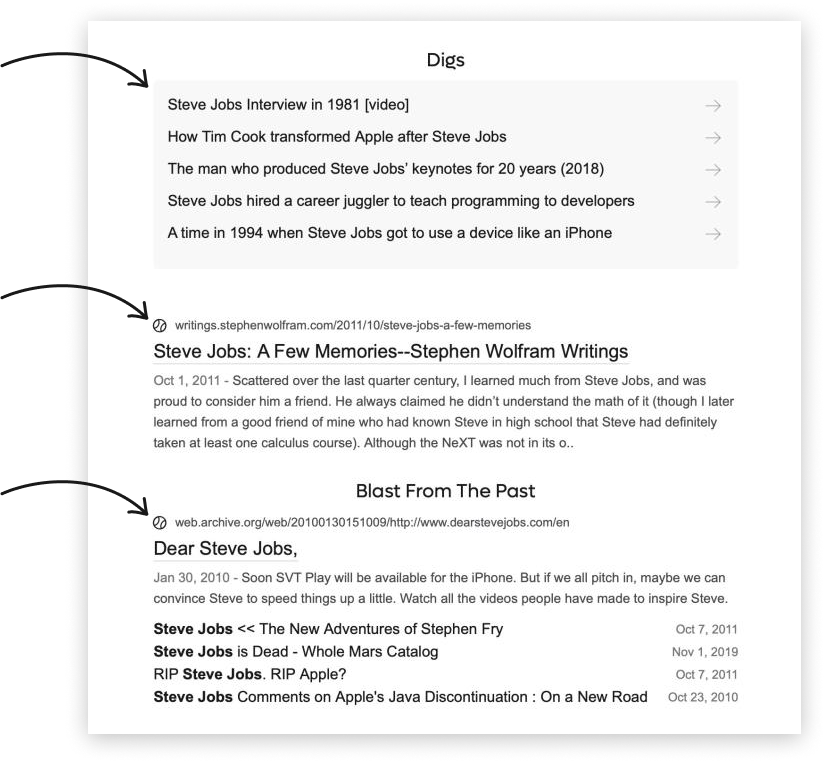Search Quality
Relevant and authentic search results
Kagi can surface unique, high-quality, non-commercial content while avoiding results bloated by ads and tracking. Kagi's non-commercial index (Teclis) and non-commercial news index (TinyGem) as well as instant answers (IA) offer high-quality, relevant, and authentic results for the user. Clicking Info in search results will show a percentage of these unique Kagi results in search results.
Take a look at Kagi’s responses to a “steve jobs” query:

These results are authentic to Kagi. To provide them, we even crawl the Wayback Machine to dig up great content that no longer exists in its original state online. In every search, Kagi will always display unique results when possible as well as some of the typical fare. Read more about our search sources.
How we rank results
Our algorithm primarily focuses on relevancy and user intent. When it makes sense, we try to prioritize non-commercial sources. A highly relevant answer to your query from a monetized site will fall lower in your results than the same answer from an educational site. Of course, if a site has a naturally high rank, Kagi factors that in as well. And if you personalize your searches, domains you lower will lose ground to domains you prefer.
Number of results
We believe the name of the game in search is quality, not quantity. A search engine's job is to provide the best answer fast and within the reach of one or two pages of results. If the user needs to go to page 17 to find what they were looking for, we have failed.
Also note that one page of Kagi results will show 30-50 organic results compared to just 10 results typically shown on other search engines. So two pages of Kagi results are actually an equivalent of about eight pages of results in other search engines!
Other search engines may also show an inflated number of results available. The reality is they don't really have that many results. You can check yourself by clicking through pages of their results, which at one point abruptly stop. Between deceiving users with a provisional high results number and showing the best results, we chose the latter.
We feel our approach is in line with our values. In the unlikely event of not finding what you are looking for in the available results, you can always modify the query slightly to get the new results.
Search neutrality and information access
As a search engine, Kagi is used to find a wide variety of information to inform and improve its users' lives. There is, however, a wide variety of content online that some may find distasteful, problematic, or immoral.
This raises difficult questions about whether Kagi should censor information found on the open web or augment results with messaging to inform users they may be making poor choices.
We do not censor information and we take our responsibility to serve our users and society seriously. Our purpose is to provide comprehensive and diverse search results to users worldwide.
When evaluating these types of decisions we use the following principles:
- Be transparent about how we think about and make decisions; we seek alternative perspectives and feedback and engage in discussions in public forums.
- These are decisions where reasonable people can disagree. We try to ensure that difficult decisions are based on well defined and agreed principles rather than arbitrarily made. Whenever possible we will yield the decision making power to the user (for example through personalization features).
- If we cannot define workable principles we seek to create accountability for the people making what end up being arbitrary decisions.
- Ideally many of these decisions with societal impact are made not by a company's employees, but by representative governments. We abide by all applicable laws governing what information people should be able to find online.
- We encourage users to report search quality issues, which we diligently investigate and resolve.
We believe the editorialization of search should rest with users, not search engines. Our role is to provide comprehensive access to information while giving users the controls they need to make informed choices about their search experience.